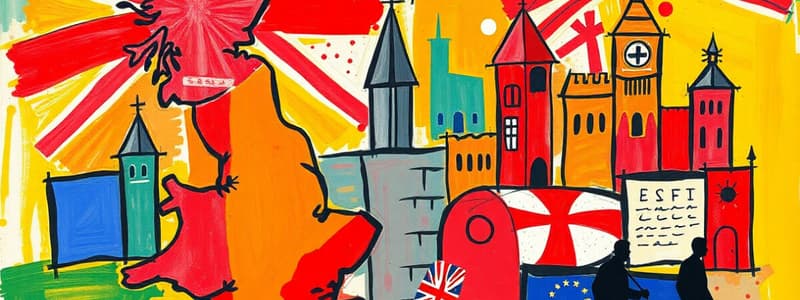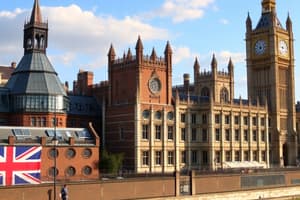Podcast
Questions and Answers
Charles was allowed to marry a ______ woman.
Charles was allowed to marry a ______ woman.
divorced
The British Royal Family's work has a substantial impact on taxpayers.
The British Royal Family's work has a substantial impact on taxpayers.
True (A)
What is a criticism levelled against the deference shown to the Royal Family?
What is a criticism levelled against the deference shown to the Royal Family?
It perpetuates inequality, hierarchy, and unfairness, making Britain seem like a class-ridden society.
Match the following criticisms to the statements provided:
Match the following criticisms to the statements provided:
Which of these statements is NOT a criticism of the British Royal Family?
Which of these statements is NOT a criticism of the British Royal Family?
What is a key function of the British royal family in the tourism industry?
What is a key function of the British royal family in the tourism industry?
The British royal family's privileged position has no downsides.
The British royal family's privileged position has no downsides.
What is a potential negative consequence of the media's focus on royal activities?
What is a potential negative consequence of the media's focus on royal activities?
The ______ of the British royals attracts tourists from all over the world.
The ______ of the British royals attracts tourists from all over the world.
Match the following aspects of the British royal family to their corresponding impact:
Match the following aspects of the British royal family to their corresponding impact:
Which of these is NOT mentioned as a potential consequence of Brexit for the UK?
Which of these is NOT mentioned as a potential consequence of Brexit for the UK?
The text suggests that London benefited financially from being part of the EU.
The text suggests that London benefited financially from being part of the EU.
What is one of the main arguments for the UK to leave the EU, according to the text?
What is one of the main arguments for the UK to leave the EU, according to the text?
The text suggests that Brexit could lead to a rise in ______ and ______ in the UK.
The text suggests that Brexit could lead to a rise in ______ and ______ in the UK.
Match the following potential Brexit consequences with their related aspect:
Match the following potential Brexit consequences with their related aspect:
In a first-past-the-post voting system, the candidate with the most votes in a constituency wins the seat, even if they don't receive an absolute majority.
In a first-past-the-post voting system, the candidate with the most votes in a constituency wins the seat, even if they don't receive an absolute majority.
Which of the following is NOT a criticism of the first-past-the-post voting system?
Which of the following is NOT a criticism of the first-past-the-post voting system?
The two main British political parties are the ______ and the ______.
The two main British political parties are the ______ and the ______.
What is the primary political stance of the UK Independence Party (UKIP)?
What is the primary political stance of the UK Independence Party (UKIP)?
Match the following political parties with their primary positions:
Match the following political parties with their primary positions:
The Royal Family is considered representative of a modern, multicultural Britain.
The Royal Family is considered representative of a modern, multicultural Britain.
What is the primary role of the British monarch in relation to the former colonies?
What is the primary role of the British monarch in relation to the former colonies?
The British monarch is the ______ head of state in some former colonies.
The British monarch is the ______ head of state in some former colonies.
Match the following terms to their definitions:
Match the following terms to their definitions:
What is a common argument against the continued role of the British monarchy in a modern society?
What is a common argument against the continued role of the British monarchy in a modern society?
Which of the following is NOT a characteristic often associated with Britishness?
Which of the following is NOT a characteristic often associated with Britishness?
The British Nationality Act of 1948 led to a decrease in immigration to the UK.
The British Nationality Act of 1948 led to a decrease in immigration to the UK.
What was a major factor contributing to increased immigration from Eastern Europe to the UK after 2004?
What was a major factor contributing to increased immigration from Eastern Europe to the UK after 2004?
The 2005 suicide bombings in London resulted in a surge of ______ and renewed discussions about integration.
The 2005 suicide bombings in London resulted in a surge of ______ and renewed discussions about integration.
Match the following terms with their corresponding definitions:
Match the following terms with their corresponding definitions:
Flashcards
Divorced Woman Marriage
Divorced Woman Marriage
Charles married a divorced woman, indicating changing royal traditions.
Royal Succession
Royal Succession
Male children are no longer given preferential treatment in the line of succession.
Royal Family Charities
Royal Family Charities
Members of the Royal Family support various charities, enhancing their public image.
Class-Ridden Society
Class-Ridden Society
Signup and view all the flashcards
Royal Taxpayer Relationship
Royal Taxpayer Relationship
Signup and view all the flashcards
First-past-the-post voting
First-past-the-post voting
Signup and view all the flashcards
Criticism of first-past-the-post
Criticism of first-past-the-post
Signup and view all the flashcards
Multi-party system
Multi-party system
Signup and view all the flashcards
Main British parties
Main British parties
Signup and view all the flashcards
Coalition government
Coalition government
Signup and view all the flashcards
Head of Commonwealth
Head of Commonwealth
Signup and view all the flashcards
Tourism Industry Function
Tourism Industry Function
Signup and view all the flashcards
Monarch's role in former colonies
Monarch's role in former colonies
Signup and view all the flashcards
British Royals' Popularity
British Royals' Popularity
Signup and view all the flashcards
Media Coverage Impact
Media Coverage Impact
Signup and view all the flashcards
Royal Family representation
Royal Family representation
Signup and view all the flashcards
Diversion of Attention
Diversion of Attention
Signup and view all the flashcards
Multicultural Britain
Multicultural Britain
Signup and view all the flashcards
Commonwealth connection
Commonwealth connection
Signup and view all the flashcards
Global Tourist Attraction
Global Tourist Attraction
Signup and view all the flashcards
Supply and Labour Shortages
Supply and Labour Shortages
Signup and view all the flashcards
Uncontrolled Immigration
Uncontrolled Immigration
Signup and view all the flashcards
Scottish Independence
Scottish Independence
Signup and view all the flashcards
Brexit as Populism
Brexit as Populism
Signup and view all the flashcards
Inner Unity of the UK
Inner Unity of the UK
Signup and view all the flashcards
Britishness
Britishness
Signup and view all the flashcards
Immigration Acts
Immigration Acts
Signup and view all the flashcards
Multiculturalism
Multiculturalism
Signup and view all the flashcards
Integration Approaches
Integration Approaches
Signup and view all the flashcards
North-south divide
North-south divide
Signup and view all the flashcards
Islamophobia
Islamophobia
Signup and view all the flashcards
Brexit
Brexit
Signup and view all the flashcards
Black Lives Matter
Black Lives Matter
Signup and view all the flashcards
Generational conflict
Generational conflict
Signup and view all the flashcards
Cultural diversity
Cultural diversity
Signup and view all the flashcards
Study Notes
General Facts
- The UK is a unitary sovereign state, comprised of four countries.
- Britain was under Roman occupation until 410.
- From the 5th century, Angles, Saxons and Jutes invaded.
- Vikings attacked and settled in the British Isles from the 8th to 11th centuries.
- The English Reformation saw Henry VIII separate the English church from Rome in 1834.
- Elizabeth I's reign (1558-1603) saw England become a leading sea power, establishing an empire.
- The Glorious Revolution (1688/89) strengthened Parliament's role, making Britain a constitutional monarchy.
- The 18th century saw Britain become a leading colonial power.
- The 1760-1840 Industrial Revolution shifted from agriculture to factory production.
- The Victorian Era (1837-1901) was a significant period, marking the height of the British Empire.
- 1914-1918 saw World War 1
- 1918-1918 saw the introduction of suffrage for men
- 1928 saw the equal suffrage.
- 1939-1945 saw World War 2
- 1945 was the year the UK became a founding member of the United Nations.
- Hong Kong was handed over to China in 1997; this marked the end of the British Empire officially.
- Queen Elizabeth II's reign (1953-2022) included Britain joining the EC (later the EU) in 1973 and the Brexit referendum in 2016.
- Queen Elizabeth II died in 2022 and King Charles III was crowned.
From Empire to Commonwealth
- Britain rose to power after controlling India (1757) and North America (1763).
- The first overseas possessions and trading posts were acquired under Elizabeth I.
- The loss of the American colonies marked a turning point for the "First Empire".
- The 19th and early 20th centuries saw Britain's peak of wealth and power, dominating a large portion of the world.
- Countries gradually gained independence through violent protests and Britain's granting of power.
- The Imperial Conference (1926) and the Statute of Westminster (1931) led to the British Commonwealth of Nations.
- Today, the Commonwealth comprises 56 member states, with Charles III as head of the Commonwealth, though head of state in only 15.
Diverging Views on the British Empire
- There are differing perspectives regarding the impact of the British Empire.
- Some view it as positive, citing progress, democratic ideals, and beneficial developments in former colonies.
- Other perspectives highlight negative aspects including racism, cultural imperialism, exploitation, and violent actions.
UK's Politics
- The UK is a constitutional monarchy, with the monarch having limited power, while Parliament holds sovereignty.
- The UK has an uncodified constitution, composed of historical documents, conventions, statute law, and common law.
Politics and Different Parties
- One form of voting used is "first-past-the-post", where only the candidate with the most votes wins a constituency.
- The UK's two main parties are the Conservatives and Labour. Other parties such as the Liberal Democrats, Green Party, Scottish National Party, DUP, UKIP and others also play a role.
Monarchy
- The British monarch has representational functions but no power to make laws.
- Key roles include appointing and dismissing ministers, opening and dissolving Parliament, and interacting with the Prime Minister.
- Public opinion on the monarchy is sometimes divided, with younger generations tending to be more critical. The monarchy faces controversies when members engage in political debate or scandals.
Brexit
- Britain joined the European Communities (EC) and later the EU in 1973.
- EU membership was a controversial and divided issue, resulting in a referendum in 2016 with the result in favor of leaving.
- Brexit generated much contention, impacting the UK's role, economy, and standing in the world.
Scotland and Devolution
- Devolution is a system of granting more power to regions in a country.
- Scotland became more independent following two referendums on the issue.
- The 1707 Treaty of Union established a single UK parliament.
UK Society
- The UK's society is diverse, encompassing various cultures, beliefs, religions and ethnicities.
- Historical events such as migration, colonialism and Brexit have had a major impact on its demographics.
Multi-Culturalism Today
- The UK is quite diverse, with approximately 14% of the population from another ethnic background, particularly in London.
- Efforts toward equality have been accompanied by challenges, with some ethnic minorities still facing disparities.
The North-South Divide
- The UK experiences regional socioeconomic differences, with north-south discrepancies in terms of economy, unemployment, housing, education and life expectancy.
Studying That Suits You
Use AI to generate personalized quizzes and flashcards to suit your learning preferences.




